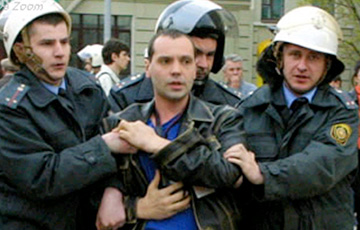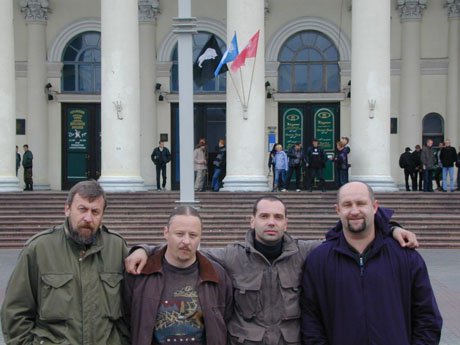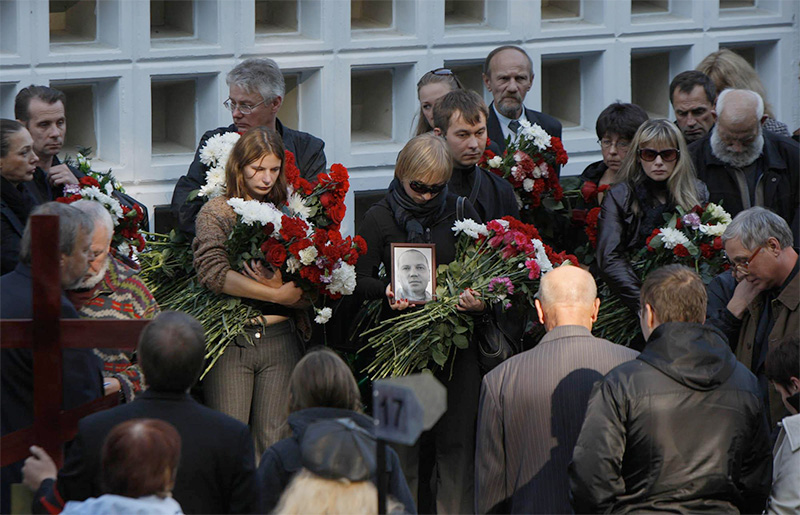Oleg
16- 14.08.2015, 11:47
- 21,444

Charter97.org continues to publish extracts from Andrei Sannikov's book Belarusian Amerikanka or Elections under Dictatorship
The beginning of extracts is available here.
A key figure was the founder of the site charter97.org, Oleg Bebenin. His tragic death in September 2010, at the very start of the campaign, without a doubt was an extremely brutal attempt by the authorities to stop our participation in the elections. It was very hard for me to make the decision to continue the campaign. All the abstract conversations with friends about how each one chooses for himself the degree of risk ran up against the real death of a close friend, a young man. After all, it could continue. On the other hand, to stop our fight in our situation could be even more dangerous – the mean-spirited government would strive to the end to retaliate against us. We discussed what to do and decided to continue the campaign, among other reasons, in memory of Oleg. Those who didn’t want to take the risk left. There were not many of them.
Oleg was a jack of all trades, he could do anything, and did do everything, and in fact equally effectively. A journalist and the founder of the Charter97.org site, he became the specialist who was needed at that moment. He took care of the transportation and the loud-speaker equipment, the print production and the moves from office to office. He could not have left life willingly. Oleg very much loved his youngest son Stepan. He and I grew even closer on those grounds. Oleg was younger than me by about 20 years, and Stepan was a year older than my son, Danik. And I think Oleg found enjoyment in speaking with me about sons, and pulling rank a little bit over me, as the more experienced father. We spoke of our children almost every day, starting in the morning.
To this day, I use accounts in social networks which he opened. To be honest, I can’t accept the thought to this day that he’s gone, even though I saw his cold body on the evening of September 3, 2010, and saw him off on his final journey.
Oleg’s brother, Sasha, was the one to report to me that Oleg had been discovered hanging at his dacha. On the morning of September 3, Katya, Oleg’s wife, called the office, and told us that he had not spent the night at home, and she was worried that something had happened to him. Oleg wasn’t at work, either. I was at home, and Oleg and I had agreed to meet that afternoon. We began calling all the possible telephone numbers we could. The previous evening, Oleg had planned to go the premier of an American film with his friends. He was a film lover and never missed a single premier. Later, his telephone calls and SMS messages would be recovered, showing that he had confirmed to friends that he would be at the movie theater.
Katya called once again and reported that she had not found the keys to their dacha. She asked her friends to drive up out there and see if Oleg was there. Sasha, Oleg’s brother, also made the trip. He then phoned that morning and reported the terrible news. Zmitser Bandarenka, Aleksandr Otroshchenkov, Fyodor Pavlyuchenko and I went out to the dacha, to Oleg.
We arrived and began to wait for the police. It was very cold. We waited for several hours. The first questions were already beginning to appear. The precinct was not that far away. Why wouldn’t the police come right away after getting a report that a man’s body had been found? One explanation: they were coordinating their actions with higher-ups.
Together with the police, we took part in looking over the scene of the tragedy. There were a lot of strange things. A kind of unnatural cleanliness in all the rooms was surprising. There were only a few ashes in the fire place, perhaps from one log, or some papers. Clearly not sufficient in order to heat this spacious house. There were no traces of any recent presence in the home of a person except for the body of Oleg, hanging in the door way. He wasn’t even hanging, but nearly kneeling. His ankle was unnaturally turned out, as if it were broken. In the room, there were, demonstratively placed against the wall, two empty bottles of Belorussky Balzam, rot-gut that even bums wouldn’t drink.
The two cops who came were noticeably tense. When we drew their attention to some details we thought were important, they inevitably tried to convince us of the opposite. On the bones of the fingers of Oleg’s left hand were bruises which might be evidence of resistance. Oleg looked as if death had come suddenly. There was no rigor mortis or other signs that a lot of time had passed, yet after the autopsy, we were told that it had all happened on September 2, that is, a day before the discovery of the body.
There were many details that didn’t fit into the hypothesis of suicide. Nevertheless, only that hypothesis was looked at by the official agencies. Oleg’s friends began to be called in for questioning. And then it was discovered that the investigation was trying to push another version of his death, that Oleg had supposedly killed himself over some dark financial matters.
Information began to be “leaked” to the Internet about how he had supposedly obtained a large sum of money. Then information was even dropped to the effect that I had settled scores with him. One of the investigators kept stubbornly asking me over and over again about the last meeting with Oleg, a day before his disappearance. He showed me papers with typed-up notes about my whereabouts. I thus learned that it was very easy to determine the coordinates of a person through his mobile phone. With a cell phone, this can be determined with accuracy to a few meters. The investigator was particularly interested in the question of why we were in a building, and then went outside. I was forced to explain that we went outside so as to avoid the bugging by his colleagues in the intelligence agencies, and for this, we took the batteries out of our telephones.
Realizing that Oleg’s death continued to be used to place pressure on us, we began to demand an independent international investigation. Journalists also made this demand. Unexpectedly, even Lukashenka began to say that Oleg’s death wasn’t a suicide.
The state media wrote about this:
Until today, the Belarusian prosecutor’s office said that this was a suicide, but on November 4, in an interview with a Polish journalist, Aleksandr Lukashenka stated that he was certain that the case of the Belarusian journalist Oleg Bebenin was criminal in nature.
“I believe, that the fact that this is a criminal act will come out, and someone will look very bad, those who today are casting a shadow on the government. As they say, the cap burns on the thief’s head. I am guilty of the fact that this happened in my country,” BelaPAN quoted Lukashenka as saying.
According to Lukashenka, any event in Belarus is connected to politics.
“As with that Bebenin. Listen, I didn’t know at all who this opposition journalist was,” said Lukashenka. “It turns out that he wrote something on the Internet on Charter. God bless you. So much is written on this Internet, so many bad things about the government…”
Lukashenka also addressed the topic of the disappearance of prominent people in Belarus.
“As for the disappeared people in our country, I’m the one most interested in this. For example, Dmitry Zavadsky worked as my cameraman, he was a good guy. What kind of politician was he, what kind of rival? And that I, as I was accused – that Lukashenka either knows about it or gave the order. And what was that guy guilty of ? Or Gena Karpenko, who died in the hospital, what has Lukashenka got to do with it? If you want to investigate this – please, come and investigate.”

It became clear that they would try to fabricate a case against us, since our presidential campaign was already visible all over the country. The authorities decided to invite OSCE experts to Belarus, supposedly responding to public demand. That made us cautious, both the fact that the dictator had doubts about the suicide story and the sudden, quick decision regarding the international expertise. Particularly memorable was the involvement under the OSCE of a German “expert,” Dr. Martin Finke, to make an appraisal of the “terrorism case” against Nikolai Avtukhovich, a businessman, who had defended his rights and uncovered facts of corruption, for which he was thrown in prison. Dr. Finke dug into some papers, and without any doubts concluded that the case was justified, but then the case fell apart..
I tried to involve as an expert the Finnish specialist Helena Ranta, my good acquaintance, a brave woman and also a human rights advocate. Helena Ranta was famous for heading a group of forensic experts working in the former Yugoslavia and confirming the facts of genocide. I wrote and phoned her, and at last I got through, but the connection was terrible, and I understand only that she was in Nepal and would not be returning soon. Later I learned that in Nepal, she had searched for the burial sites of five students who had been arrested and then went missing in 2003. She managed to find all five graves, but she was not able to help us.
I suspect that just as in the case of Avtukhovich, Oleg’s case would not have gone by without the mediation of some diplomats, and agreements with the authorities that the “experts” would guarantee the appropriate results.
That’s exactly what happened. Recalling the scandal with the German expert, two Scandinavian specialists came incognito and didn’t reveal their names. They studied the papers offered them, spoke with relatives and friends and confirmed the suicide variant. I was unable to meet with them, although we had a meeting scheduled. For some incomprehensible and strange reasons, on that day, my flight from Prague, on which I was supposed to return to Minsk, was delayed. There were clear September skies and no technical reasons were reported, but I arrived after the experts themselves had already flown out.
Zmitser Bandarenka met with these specialists and assessed their “activity”:
“On the basis of the information with which I acquainted myself from the conclusion of the OSCE experts, I can say two things. The experts confirmed that they did not conduct their own investigation, and could not conduct it, but only familiarized themselves with papers which were provided them by Lukashenka’s prosecutors and police. And the only claim that they managed to make was this: that Oleg Bebenin’s death came from suffocation. We, friends and colleagues of Oleg, had said from the outset that Oleg did not hang himself, he was hanged, and that the authorities announced to the mass media even before the autopsy was completed that Oleg Bebenin had ended his own life. Other variants of the Belarusian police and prosecutor’s office were not reviewed or investigated from the outset.
The impression was created that the experts who came were a plaything in the political games of the Belarusian regime and those Western politicians who try to save the last dictatorship in Europe. On the basis of the facts which the experts confirmed who came for three days, it is completely impossible to speak definitively about a suicide. The phrase “OSCE expert” would soon become a household word in Belarus, since the people who came to the country did not take into account the fact that Belarus is a totalitarian state and that it was impossible to make their conclusion only on the basis of papers provided by the regime’s enforcement agencies.

The previous OSCE expert who had come to Belarus from Germany and made the conclusion on the case of the political prisoner Nikolai Avtukhovich also fell into a trap when, on the basis of documents of the investigation, he confirmed the prosecution’s claim that the businessman was a terrorist. But everyone knows that Avtukhovich’s case fell apart even in Lukashenka’s court. After the government changes in Belarus, a real investigation into the death of journalist Oleg Bebenin will be made, along with other sensational cases in Belarus.
At the Amerikanka, as the KGB’s prison is called, where we landed after the elections, the story of the investigation of Oleg’s death had an unexpected continuation. The KGB officers confirmed to Zmitser Bandarenka, Natallia Radzina, my wife and me, that Oleg was murdered. Col. Orlov, head of the KGB pre-trial detention prison also told us this, as well as Igor Shunevich, the head of the investigative department, and then later the “counter-revolutionary” division of the KGB, who was for his “services” in 2012, made Interior Minister. To be sure, they tried to suggest to us that Oleg’s murder was at the hand of some “strangers,” and that the KGB supposedly had nothing to do with it.
But Oleg was gone. In the heat of the presidential campaign, we thought more of how to fill the breaches, the serious holes which had to be patched after his death. Today, we keep remembering more and more what he was like. You realize that you still miss him. You remember that Oleg was ready to sacrifice a lot for the sake of the common cause. Sometimes, even things that were valuable by any measure.
Once, in order to create a temporary alliance before some action which we were preparing, Oleg sacrificed to a certain intractable politician an entire album of rather valuable stamps which he had once loved to collect. The politician appreciated the generosity of the gift and joined the coalition. This is a point not about the mercantile nature of the politician, but about Oleg’s nobility.
He had a remarkable trait: to take an interest in what was important and interesting for his friends. And after a time, these interests would become his own. I was sincerely happy when films and music which had influenced me became part of his system of values entirely naturally and sincerely, although we were in different generations.
Oleg is gone. No doubt he would have sat with us in the Amerikanka as well, and at the colony, and would have once again been an indispensable bundle of energy and source of optimism…
To be continued










